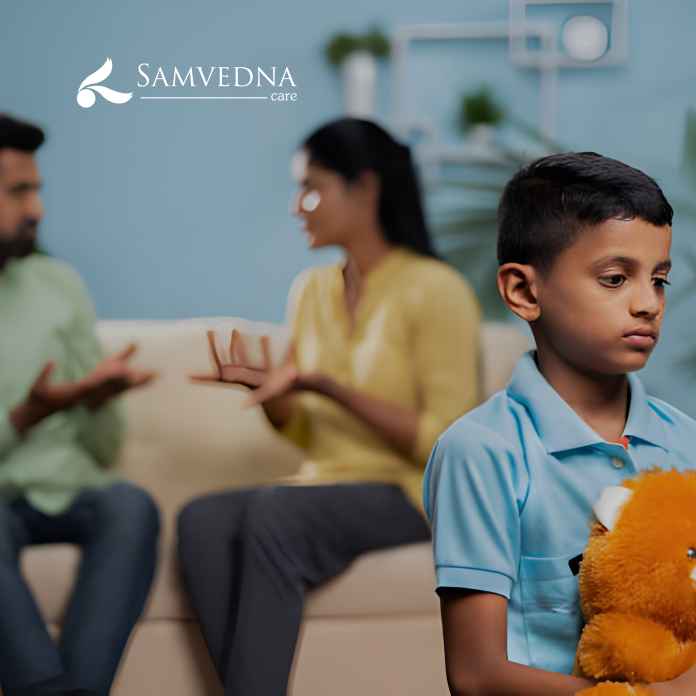Contact Us




Childhood, for many, evokes memories of innocence, laughter, and boundless curiosity. However, for others, it may harbor darker recollections—ones marked by fear, neglect, or even abuse. The effects of childhood trauma are profound and can reverberate throughout one’s life, casting long shadows on mental health and well-being.
Samvedna Care recognizes the critical impact of childhood trauma encompasses a spectrum of experiences, ranging from physical or emotional abuse to neglect, loss of a loved one, or witnessing domestic violence. These events, especially when prolonged or severe, can shape a person’s psychological and emotional development in significant ways.
When a child experiences a traumatic event, their brain activates the “fight or flight” response. While this response is crucial for survival, chronic activation due to repeated trauma can lead to long-term changes. Key areas affected include the amygdala, responsible for emotional regulation; the hippocampus, critical for memory formation; and the prefrontal cortex, which governs executive functions like decision-making and impulse control.
The Impact on Mental Health
1. Psychological Framework
Childhood trauma disrupts the normal progression of emotional and cognitive development. It can alter a child’s perception of safety and trust, leading to difficulties in forming healthy relationships later in life.
2. Emotional Well-being
Emotional regulation becomes a task for those who have experienced trauma. Anxiety, depression, and mood disorders are common manifestations. These conditions often persist into adulthood, posing challenges to daily functioning and overall quality of life.
Also, children who experience trauma are at a heightened risk of developing PTSD. Symptoms include flashbacks, nightmares, severe anxiety, and uncontrollable thoughts about the traumatic event. This disorder can significantly disrupt daily life and make it challenging to maintain healthy relationships.
Attachment: Early trauma can disrupt the formation of healthy attachments. Children who experience neglect or abuse may develop insecure attachment styles, leading to difficulties in forming and maintaining intimate relationships in adulthood. They may become overly dependent, avoidant, or struggle with trust.
Substance Abuse: There is a strong correlation between childhood trauma and substance abuse. Many individuals turn to drugs or alcohol as a coping mechanism to numb the emotional pain. This can lead to addiction and further complicate mental health issues.
Interpersonal Difficulties: Individuals with a history of childhood trauma often struggle with interpersonal relationships. They may have difficulty trusting others, fear abandonment, or have poor communication skills. These issues can lead to social isolation and loneliness.
Difficulty with Authority: Traumatized children may develop a mistrust of authority figures, which can persist into adulthood. This can lead to conflicts at work or in other structured environments, making it difficult to maintain stable employment.
3. Physical Health
The toll is not merely psychological. Research shows a link between childhood trauma and physical health issues such as chronic pain, autoimmune disorders, and even cardiovascular diseases in adulthood.
While the impact of childhood trauma is profound, it is not necessarily definitive. Resilience, often cultivated through supportive relationships and therapeutic interventions, plays a crucial role in mitigating its lasting effects.
1. Therapeutic Interventions
Therapy—be it cognitive-behavioral, trauma-focused, or expressive arts—provides a safe space for individuals to process their trauma and develop coping mechanisms. It fosters resilience by reframing negative thought patterns and building emotional strength. Mental health therapists play a crucial role in delivering these therapeutic interventions, offering accessible support that adapts to individuals’ needs and circumstances through offline and online counselling.
2. Support Networks
Social support is a cornerstone of healing. Strong, nurturing relationships with friends, family, or support groups can buffer the adverse effects of trauma, offering empathy, validation, and a sense of belonging.
3. Education and Awareness
Raising awareness about childhood trauma is pivotal. It encourages early identification and intervention, equipping the individual and caregivers to create safe environments and provide timely support. Engaging in self-care practices, such as mindfulness, exercise, and creative activities, can further aid in recovery.
Understanding the lasting impact of childhood trauma is not just a matter of empathy; it is a call to action. By fostering environments that prioritize safety, nurture resilience, and offer compassionate support, we can break the cycle of trauma and pave the way for healthier futures.
As we navigate the complexities of mental health, let us remember that each individual’s journey is unique. By acknowledging the shadows cast by childhood trauma and illuminating pathways to healing, we empower survivors to reclaim their narratives and rewrite their stories of resilience.
In this pursuit, Samvedna Care stands at the forefront, advocating for the transformative power of compassion and understanding. Together, let us forge a future where every child grows up in an environment that nurtures their potential and protects their well-being.
Samvedna Care offers online counselling and expert mental health therapists who specialize in trauma recovery. Together, let us champion environments that prioritize safety, foster resilience, and extend compassionate care to every individual in need. By illuminating pathways to healing, we empower survivors to rewrite their stories of resilience and reclaim hope, one courageous step at a time.”
Remember, healing is not linear—it is a courageous journey of reclaiming hope, one step at a time.